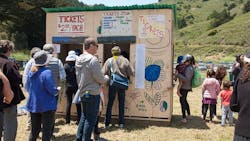Cancelled Fundraisers Mean Cancelled Funds for VFDs
Editor's note: Find Firehouse.com's complete coverage of the COVID-19 pandemic here.
Before the COVD-19 pandemic swept across the globe, radically changing the way we live, U.S. volunteer fire departments were already in a precarious position.
Difficulties with recruitment and retention were compounded by financial struggles for many departments. Now social distancing and stay-at-home orders have amplified those money issues, forcing departments to pull the plug on much-needed community fundraisers that provided the revenue to keep them running.
"We had to cancel a May event," said Newburg, WV, Fire Chief Bill Larew about the department's decision not to hold the last of its four fundraising dinners. The May event was also being held in conjunction with a local high school alumni association.
"Generally, we raise $1,300 to $1,400 at these," said Larew, adding that this was the first time he's ever had to cancel a fundraising event.
Newburg is not alone in watching its funding opportunities fall away amid the pandemic.The North Folk and Eagle Mountain departments—both in Texas—cancelled separate barbecue fundraisers, which provided a great deal of revenue for both. The Muir Beach Volunteer Fire Department in Northern California also called off its 48th annual barbecue on May 24 and is exploring alternate dates for later in the year.
Aquashicola Volunteer Fire Company in Pennsylvania cancelled its annual fish fry, which had already been pushed back from March 30 to April 19.
"The coronavirus pandemic has affected many organizations' fundraising activities, including this very important fundraiser for us," department President Rory Koons wrote in an online post. "We rely heavily on this annual event to help meet our financial obligations. As a result of this cancellation we are looking into different types of fundraisers, perhaps in late summer or early fall."
The department also had to indefinitely suspend another source of income. Rentals of the department's social hall for events "have been postponed to a later date," Koons added.
RELATED:
- COVID-19: Firefighters Turn to More PPE, Precautions During Outbreak
- COVID-19: First Responders Caught in the Pandemic
While Aquashicola and other departments are considering alternative fundraisers, Newburg's Larew is taking a different approach.
May's cancelled event had always been the final fundraiser of the year for the department, and even if gathering restrictions are lifted in a few months, Larew isn't keen on scheduling events in the summer, because they usually perform poorly. He also isn't a fan of gun bashes, popular fundraising events for neighboring departments, such as Reedsville and Tunnelton.
"We separate wants from needs," the chief said about how his department is coping with the reduced funds. "There's some equipment we're kind of holding off on here."
That's a refrain Steve Hirsch, chair of the National Volunteer Fire Council, has been hearing from departments across the country.
"Revenues are down," he said. "You're trying to figure out how to cut 50 percent of your budget and you don't know how to do that without affecting service."
Geography plays a large part in how the pandemic effects department's income streams. In states such as Kansas, where Hirsch lives, volunteer fire departments are tax supported. But for departments on the East Coast, which don't have public funding, the impact has been devastating.
"For me in the Midwest, it's been a real eye-opener," Hirsch said.
But even tax support and municipal money isn't a guarantee in a COVID-19 world. Hirsch said that as the pandemic rolls on, some cities and counties could be financially stretched thin themselves.
Although not pandemic-related, Preston County pulled back its annual donation to the 12 volunteer fire departments in the area last month, including Newburg. Each of those departments now must deal with the loss of $2,500 at a time when they desperately need it.
"That $2,250 would help buy diesel fuel for a year,” Larew told The Dominion Post. “The county gets a lot of bang for their bucks. It costs them nothing for us volunteering our time. It’s a slap in the face."
Hirsch said that he has heard of departments considering holding alternative fundraisers during the pandemic, such as web-based auctions. He also has suggested grants and loans such as those obtained through FEMA's Assistance to Firefighters Grant program.
In spite of all this dire financial news for VFDs, there have been some small bright spots, Hirsch said. While some departments have seen a spike in spending when it comes to purchasing PPE supplies to battle COVID-19, overall calls have been down, which is creating a savings for many departments, he said.
Larew said that his department had a very busy January, but since then "life's been pretty normal." He has seen no uptick in calls caused by COVID-19, and members have mostly been responding to drug-related calls.
And although it hasn't necessarily come in actual dollars, Hirsch has seen communities supporting their departments. After the flu hit one department in central Kansas, neighbors stepped up to fill the depleted ranks.
"I guess in some ways it's building better neighbors in us," Hirsch said about the pandemic. "We're helping out one another. … And that's what the volunteer fire service is all about, helping your neighbor when they need our help the most.
"And that goes to helping out our neighbor fire departments and EMS agencies, too."
